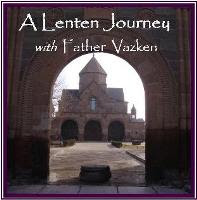New Year, Discipline and Theophany
Armodoxy for Today: The New Year, Discipline and Theophany
All good things come with discipline. The New Year brings with it a convenient mark on the calendar – a before and after moment, a restart button, so to speak, and discipline seems to somehow be connected to everyone’s resolutions.
Discipline for the Christina includes a regular prayer life, engaging with the Teachings of Jesus, and regular participatory practice in community worship. Christianity engages the body, soul and mind with its teachings and practices.
Toward the discipline of the body, the Church prescribes fasting. We are now in the fasting period for Theophany.
Every major event in the Armenian Church, is preceded by a period of fasting. The practice can take different forms. Whether you fast completely or partially, the matter is between you and God, and no one else. In the Sermon on the Mount (Matthew 5-7) Jesus instructs us to keep our religious practices, including fasting, between ourselves and God.
When you fast you only naturally think of food. Hunger brings pain physically and psychology you experience discomfort because you know that food is only a few steps or minutes and yet you are being deprived of food of your own will. In that discomfort you understand Christ’s words, “Man shall not live by bread alone, but by every word that proceeds from the mouth of God.” (Matthew 4:4)
The first day of fasting is truly the hardest because your body is acclimating to the hunger. On the second and third days your body begins to understand that there is a change and accepts hunger and focuses on strengthening the spiritual and psychological senses.
Theophany is in sight. It is the revelation of God, the Creator, Jesus Christ on earth, in our midst. Being ready psychologically and emotionally has been the journey of the last several weeks. This last week, with the addition of fasting, we bring these all elements together to meet and greet Christ in his Incarnation.
If you were to see Christ in your midst, that is, with you and your family and friends, what would be your reaction? Would you say, “Merry Christmas?” Would you say, “Christ is in our midst?” or would your reaction be more profound? Would you be shocked and in awe? Finding that perfect expression of joy in meeting the Christ Child in our midst is the focus of this Advent Journey.
Let us pray, Lord Jesus, you were born and revealed, bringing Light into the world. Fill the darkness that surrounds me with the Light that is you. Fill my heart with your Love, so that there is no room for hatred, disease and evil. Strengthen me, allow me to grow in discipline so that I may meet you as disciple of your love. Amen.





